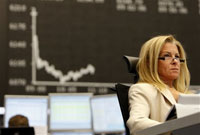Asian and European stock tumble again
Asian and European stock markets fell sharply Tuesday as investor confidence in the U.S. financial system eroded further despite a government-backed plan to help beleaguered mortgage financiers Fannie Mae and Freddie Mac.

Financials were hit particularly hard as investors worried that trouble in the U.S. markets would spillover to Asia and Europe.
By afternoon in Europe, Britain's FTSE 100 had fallen 2.55 percent to 5,165.20, Germany's DAX lost 2.60 percent at 6,039.20 and France's CAC-40 retreated 2.18 percent to 4,052.28.
Fears of yet more bank losses in Europe weighed on stocks. Several major banks have written off billions and had to raise more capital.
"We have got results coming out later in the week and there are worries there are going to be more writedowns," said Lawrence Peterman, investment director at Eden Financial in London.
Official figures showing inflation in Britain hit a higher-than-expected 3.8 percent in June, up from 3.3 percent in May, was also having an effect, Peterman said.
In Asia, every major index suffered declines, with Hong Kong's Hang Seng Index dropping more than 3.8 percent and Taiwan's benchmark losing over 4.5 percent. In Tokyo, the Nikkei 225 index dropped nearly 2 percent to close at 12,754.56.
Japanese traders were rattled by a local business newspaper report that the country's top three banks hold a combined 4.7 trillion yen (US$44 billion) in Fannie Mae and Freddie Mac debt. Another newspaper report unnerved Taiwan's market with news that at least two leading financial institutions have invested in the mortgage giants, and the country's central bank may also have purchased their bonds.
In China, rumors were circulating that the Chinese government had also invested in Fannie and Freddie bonds.
The two government-chartered companies received a boost Sunday when the U.S. central bank and Treasury Department promised to step in with short-term funding and other aid should mortgage losses mount. Together, the companies hold or back about half the outstanding mortgages in the United States.
A sell-off of regional banks overnight on Wall Street, as well as fears that other American banks might face difficulties ahead, only added to the unease. On Monday, the Dow Jones industrial average fell 45.35, or 0.41 percent, to 11,055.19 after spiking nearly 140 points in early trading.
"Investors are quite concerned we could be heading toward a meltdown in the equities market if there's no rebuilding in confidence, especially in the U.S.," said Alex Tang, head of research at Core Pacific-Yamaichi in Hong Kong.
In Japan, banks and insurance issues got slammed.
Mitsubishi UFJ Financial Group plunged 5.32 percent, Mizuho Financial Group was down more than 5 percent, and Sumitomo Mitsui Financial Group plunged 6.11 percent. Earlier in the day, the Bank of Japan kept interest rates on hold, deciding to take a wait-and-see approach amid the current volatility.
"With regard to risk factors, global financial markets remain unstable and there are downside risks to the U.S. and the world economy," the central bank's policy board said in a statement.
A higher yen dragged down major exporters such as auto makers and electronics firms. A stronger Japanese currency reduces the value of exporters' profits when repatriated from abroad.
In Hong Kong, the blue-chip Hang Seng Index plunged almost 840 points to 21,174.77 - its lowest close in nearly four months.
China's biggest lender, ICBC, dove nearly 5.2 percent, and HSBC lost more than 3 percent. Heavyweight China Life Insurance slid 5.3 percent.
In mainland China, the benchmark Shanghai Composite Index fell 3.4 percent to close at 2779.45.
The drop was sharpest for real estate developers, banks and insurers. Among financial companies, China Life and Ping An Insurance both tanked 6 percent. Midsize lender Pudong Development Bank Ltd. dropped 7.1 percent.
The government is due to release closely watched inflation data Thursday, which could add to pressure for an interest rate hike. Analysts expect a decline from May's 7.7 percent but expect the rate to stay above the government's 4.8 percent target for the year.
Elsewhere, South Korea's benchmark slid 3.2 percent, India's Sensex was down 4.6 percent in late trade and Australia's main index lost 2.1 percent.
Subscribe to Pravda.Ru Telegram channel, Facebook, RSS!

